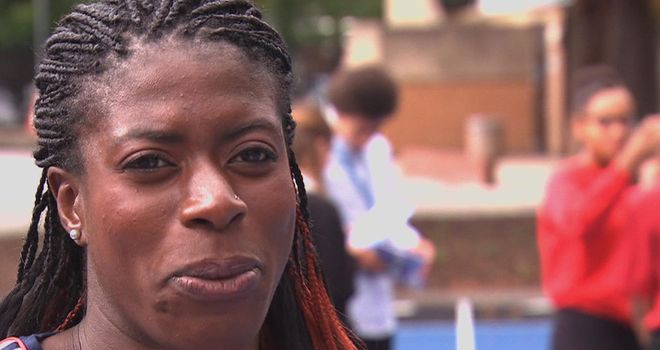London 2012 pledged to inspire a generation but the golden legacy is being lost on young girls, as Sky Sports has discovered.
Britain's Olympics were anointed the 'Women's Games' as the likes of Jessica Ennis-Hill, arms aloft on the Stratford track, and Nicola Adams, a trailblazing blur of punches, were celebrated across the nation's front and back pages.
But the euphoria of last summer's unprecedented female sporting success has struggled to translate at grassroots level.
"A lot of girls aren't interested in sport because at this age, you kind of get interested in other things," says one teenage girl in a schoolyard in Stoke Newington, north London. "Some are just scared that the boys are better than them and they'll lose," nods another. "And if you get sweaty, you might look really unattractive."
Be the fear one of losing, or simply losing face, 400m champion Christine Ohuruogu believes an unwanted phenomenon needs greater investigation.
"The excuses are quite flimsy," Ohuruogu told Sportswomen, the new weekly Sky Sports show dedicated to women's sport. "But they're still preventing girls from doing sport so you still have to look into them."
Baronness Sue Campbell, chair of the Youth Sport Trust, insists elite sportswomen cannot shoulder the burden of being positive role models.
"I think it's important that we see people in the pop world, in the media world, also putting an emphasis on being fit and healthy because for many young women that will influence them a lot more than seeing a superstar in sport," she said.
The Women's Sport and Fitness Foundation (WSFF) has traced damning figures on dropout rates back to the playground. More than half of girls last year were put off physical activity by their experiences of school sport and PE.
"School sport is still not right in so many cases," said Sue Tibballs, CEO of the WSFF. "I've grown up in a generation where so many adult women's attitude to sport is, 'Oh, PE at school, so awful,' and they've never really recovered, so it's a shame to know that that is still going on."
Even the government, which has sold off two school playing fields each month since the Olympics, knows action is needed.
"We've recently announced that £300m over the next two years will be invested in primary schools to make sure that girls, right at the beginning, get into the sporting habit and stick with it," said Minister for Women, Maria Miller.
But increasing participation is about far more than medals and glory. Obesity in Britain costs the NHS £4.2billion every year.
"The Olympics has shown us girls coming out on top; we did really, really well, and I think a lot of girls are seeing that," Ohuruogu adds.
"But what we're trying to say to girls is that whether you want to go ahead and be a professional or not, it's still important that you still maintain a healthy lifestye and that you're still being active."
Have your say by tweeting @SkySportsNews using #Sportswomen: why are teenage girls dropping out of sport? And what can be done?
Watch Sportswomen, Sky Sports' new weekly show with news and views from women's sport, each Tuesday from 10.30am on Sky Sports News.




